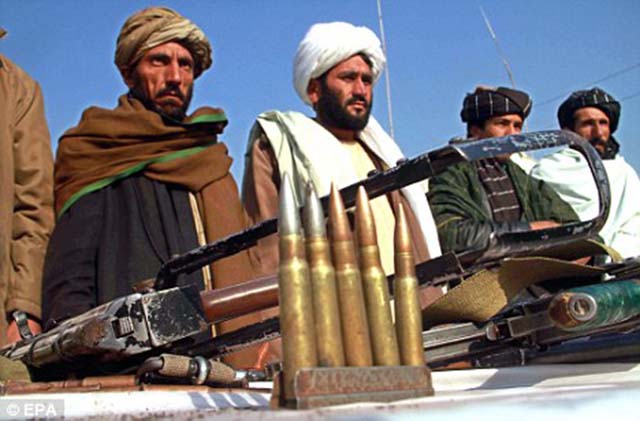Preliminary assessments by intelligence agencies show that terrorist groups in Afghanistan are criminal groups, Taliban and foreign terrorists who commit unforgivable crimes on behalf of outsiders and drug smugglers,” these words are spoken by President Muhammad Ashraf Ghani. He also believes that militants that launched attacks in restive parts of the country aimed to accomplish the outsiders’ goals. Regarding crimes perpetrated by the Taliban insurgents, that include mass murder and looting in Kunduz, Ghani aired that the traitors were being financed by external elements behind the killings of Afghans and the looting of their properties.
The Taliban’s heavy inroads and resilient power demonstrate that they are supported militarily and strategically by the outsiders and perhaps members of Mafia group – who are fishing in troubled water. The political chaos paves the way for criminals to pursue their sinister goals across the country. It is believed that a large number of the Taliban are pawns in the political game who are unaware of being employed by real players. In other words, the militants involved in insurgency in Afghanistan, despite the withdrawal of foreign forces, are not the ideologues but mercenary fighters. Therefore, they target the Afghan police and civilians alike.
The drug smugglers will be widely involved in current political unrest. After all, narcotic forms the bulk of the Taliban’s financial resources. They have opposed eradication efforts in order to build support among farmers in rural areas which are crucial to their insurgency, particularly in the southern provinces of Kandahar and Helmand. And where opium is produced in areas where they are dominant, they assess a 10 percent tax on it; a major source of finance for their activities.
At the end of 2014, NATO’s combat mission officially ended and the vast majority of foreign troops pulled out of Afghanistan. But the war is far from over. The Afghan army has now inherited a war that promises to be much longer and more difficult than that of NATO.
With unmitigated attacks of the Taliban in recent months, tension emerged between Kabul and Islamabad as Afghan officials charged ISI of backing the insurgents. Following the heavy attacks in Shah Shaheed on August 07, 2015, Ghani said, “Pakistan still remains the venue and ground for gatherings from which mercenaries send us a message of war.” He added that at the time Pakistan President Nawaz Sharif said the enemies of Afghanistan are the enemies of Pakistan, “now the time has come for him to prove it.”
However, Pakistan has frequently denied the finger pointing and emphasized on resuming peace talk. Of late, Express Tribune reports that Prime Minister Nawaz Sharif is likely to brief US President Barack Obama about Pakistan’s efforts to resume talks between Afghanistan and the Taliban. The newspaper quotes an anonymous source as, “PM Nawaz, during his visit to the US will brief US President Barack Obama about Pakistan’s efforts on resuming talks between Afghanistan and Taliban.” It adds that the US is interested in seeing concrete steps being taken from Pakistan’s side regarding the peace process.
In spite of the Afghanistan’s persistent efforts, peace talk between Afghan officials and the Taliban elements have never and will not ever come to fruition. The Taliban, on one hand, constantly gave the officials the green light but on the other hand, intensified their attacks. Their dual dealings have led to mistrust. It is believed that if terrorism was a political issue, diplomatic and non-violent mechanism would be effective. But terrorism is a legal phenomenon which sends the message of war and violence and seeks their material interests insatiably. Therefore, a military strategy will be far effective than diplomatic one – as other countries, including Pakistan, exercise the same method.
However, foreign politicians think optimistically about peace talks. As a result, U.S. Army General John Campbell is quoted as, “I think it’s going to take a good couple of months before we see them kind of back to any kind of peace negotiation.” He adds, “I think reconciliation talks will continue, but it’s going to take some time to bring the right people to the table to do that.” He further believes that 60 to 70 percent of the Taliban members would ultimately be open to reconciliation.
I do not agree with the Campbell’s recent statements on the grounds that the militants’ heavy inroads reflect the opposite of what he says. It should be noted that the Taliban are more than “political discontent” and will not lay their arms through diplomatic way (negotiation). Similarly, their thirst will not be satiated by rational discussions but material interests.
Since Pakistan herself is in the grip of terrorism and insecurity, its role is not of much significance. It will repeat the same old games which have been played a thousand and one times but in vain. Islamabad’s unabated appetite for prerogative pushes it to nudge the Taliban to come to the negotiation table and therefore urges Kabul to resume the talk.
But the Taliban will not leave the ground in favor of the Islamic State (IS) group. It is self-explanatory that if the Taliban put down their arms, the IS will extend its influence and spearhead terrorist acts without obstacles. Hence, peace talk resumption will polarize the Taliban militants and only few will show tendency in this regard not 70 percent. It would be far effective if foreign countries increase their forces and tackle the issue militarily alongside the Afghan soldiers.

